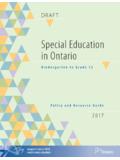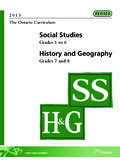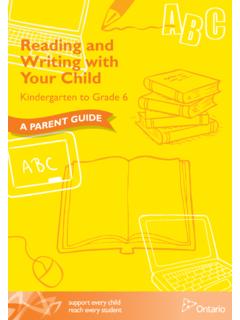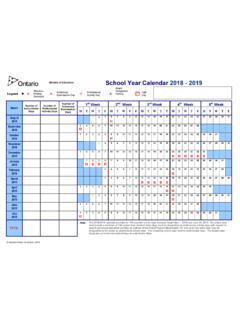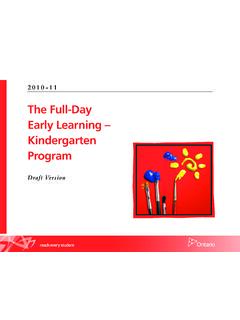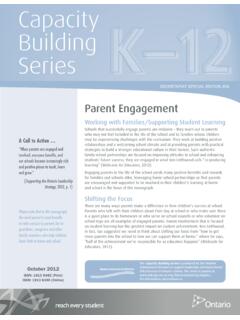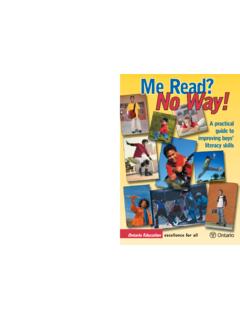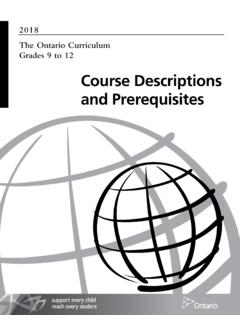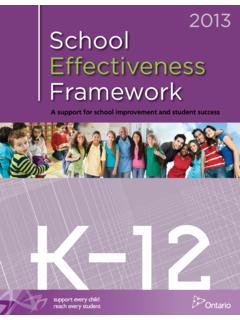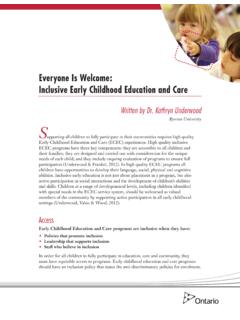Transcription of Learning for All
1 Learningfor AllA Guide to Effective Assessment and Instruction for All Students, Kindergarten to Grade 122 0 1 3 The Ontario Public Service endeavours to demonstrate leadership with respect to accessibility in Ontario. Our goal is to ensure that Ontario government services, products, and facilities are accessible to all our employees and to all members of the public we serve. This document, or the information that it contains, is available, on request, in alternative formats. Please forward all requests for alternative formats to ServiceOntario at 1-800-668-9938 (TTY: 1-800-268-7095).
2 Une publication quivalente est disponible en fran ais sous le titre suivant : L apprentissage pour tous : Guide d valuation et d enseignement efficaces pour tous les l ves de la maternelle la 12e ann publication is available on the Ministry of Education s website, at 3 Background 3 Alignment with Ministry Policies and Initiatives 51. Introduction 7 The Vision and Purpose of Learning for All, K 12 7 The Organization of the Guide 92.
3 Instructional Approaches 11 Understanding Achievement Gaps 11 Three Effective Approaches 12 Universal Design for Learning 13 Differentiated Instruction 17 How Common Classroom Strategies Support Principles of UDL and Differentiated Instruction 22 The Tiered Approach 243. Assessment for Learning 27 Types of Assessment 27 The Benefits of Assessment for Learning 28 Components of Assessment for Learning 284. Planning Assessment and Instruction 33 Knowing Your Students 33 Developing a Class Profile 34 Developing a Student Profile 42 Planning for Student Transitions 515.
4 L earning for All through Professional Learning 53 The Three Big Ideas Guiding PLCs 54 Conclusion 58 Appendix A: Class Profile Template 60 Appendix B: Student Profile Template 61 Appendix C: Questions to Guide System and School Implementation of an Integrated Process of Assessment and Instruction 62 Glossary 64 References 67 3 PrefaceLearning for All.
5 Kindergarten to Grade 121 is a resource guide outlining an integrated process of assessment and instruction for elementary and secondary school educators across Ontario that is designed to help raise the bar and close the gap in achievement for all students. The guide supports the three core priorities for education in Ontario: High levels of student achievement Reduced gaps in student achievement Increased public confidence in publicly funded educationBackgroundEducation for All, Kindergarten to Grade 6In 2005, the Ministry of Education released Education for All.
6 The Report of the Expert Panel on Literacy and Numeracy Instruction for Students With Special Education Needs, Kindergarten to Grade That document was instrumental in helping to improve achievement in literacy and numeracy among students with special education implementation of Education for All, K 6 was supported by two projects in the field. The Special Education Project essential for Some, Good for All (2005 08), conducted by the Council of Ontario Directors of Education (CODE), implemented the recommendations in Education for All, K 6, with a focus on literacy and numeracy instructional strategies, to improve student achievement for all students and in particular for students with special education needs.
7 The other project the Student Assessment Project, Kindergarten to Grade 4 (2006 08), conducted by the Ontario Psychological Association provided educators and professional services staff with strategies to strengthen the connection between assessment and classroom teaching for students with diverse strengths and encouraging results achieved through these two projects, together with the positive response of educators in both elementary and secondary schools to the ideas and strategies outlined in Education for All, K 6, gave the ministry the directional support to develop a resource that would assist Ontario educators in raising the bar and closing the achievement gap for all students, from Kindergarten to Grade Learning for All, K 12 As a first step in developing a K 12 resource guide following from Education for All, K 6, the ministry confirmed, through broad consultation with educators and other stakeholder groups, that the guiding principles and key themes of Education for All.
8 K 6 were essential to any effort to improve the achievement of all students across the education system. As a 1. Referred to henceforth as Learning for All, K Referred to henceforth as Education for All, K Learning for Allresult, those guiding principles expressed in Education for All as a set of shared beliefs (p. 4) are now also identified as program planning considerations in all revised Ontario curriculum first draft of Learning for All, K 12 went out to directors of education across Ontario in 2009, along with funding to school boards3 to support related professional Learning .
9 Eleven lead boards also received funding to begin to use the strategies in selected elementary and secondary schools. The lead boards coordinated Learning for All K 12 professional Learning communities in their respective regions; collected resources developed by school boards; formed a Learning for All K 12 Provincial Network Team to share Learning and resources; and gathered feedback to inform the revision of the guide. With the release of the revised draft of Learning for All, K 12 in 2011, seven lead school boards were added to expand the network, and the initiative Learning for All K 12 Regional Projects , which included teacher-led projects at the classroom level, was introduced to help mobilize knowledge.
10 In addition, the Learning for All K 12 Provincial e-Community was established to facilitate the sharing of Learning and resources. Throughout this period, the ministry also continued to consult with educators and key stakeholder groups and gather public feedback. The present document reflects the consolidation of the valuable information we of Success In 2012, CODE released Leading for All: A Research Report on the Development, Design, Implementation and Impact of Ontario s essential for Some, Good for All Initiative (Hargreaves & Braun, 2012; available at ).
